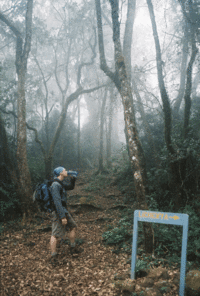Alan Bush
From Santa Fe Institute Events Wiki
Alan is a recent Masters graduate of the Center for Sustainable Systems housed within the School of Natural Resources & Environment at the University of Michigan. Past work has been as a director of projects for community asset development projects in Malawi, urban geographical research in South Africa, community asset assessment in India and New Zealand. Undergraduate work was at Pomona College in development economics and international relations. His current work includes systems modeling, industrial ecology, and principles for sustainability.

Long Term Interests:
I believe cities are a complex adaptive structure critical that is to societal sustainability. We must recognize cities for the kind of resources they are before we can properly harness them as the foundation and catalyst of a sustainable society. I wish to further the understanding of cities that the science of complexity provides, and further develop an argument for why and how cities are critical to global sustainability.
My recent work has focused on localization, an idea that a group of us at the University of Michigan (and elsewhere) have been developing. Localization is not de-globalization; rather, it is a shortening of the distances between people and the provisioning of their basic needs. Localization can be a potential complex adaptive strategy, a system change that can propagate across a society and improve its resilience. Most importantly, it can be a potential catalyst for producing the structures necessary for sustainability in cities, especially in rapidly developing mega-cities. I wish to explore how to explain localization as a strategy with the language of complexity.
Localization–like a sustainable society–is far from inevitable. In order for cities to develop the structures of localization, institutions that can catalyze localization are necessary. An example might be a hybrid business that franchises, using urban/rooftop agriculture in neighborhoods to provide public goods (like storm water capture and heat island reduction) while producing green jobs and local produce. These institutions will be the facilitators of localization and the anchors of urban sustainability. I want to use the structural wisdom of complexity to help and use the tools of complex systems to guide the “blueprinting” of what urban localization might look like. Taken collectively, I wish to use complex systems science to pry open the nut of what role cities will play in a sustainable society, and how we craft sustainable cities.
Recent Projects:
ReFab: An interdisciplinary team, working to establish a process for identifying and reprocessing waste streams for use as architectural elements. What this meant we were doing is materials flow analysis, playing with tessellation and other wacky paper-folding math, digging in junk yards, and bending car hoods into cool shapes for an art installation.
Localizing the Food System: Identifying the necessary and sufficient institutions to transform a local food system. This came out of a working group on Localization. The project reframed Localization as a adaptive strategy for transforming a complex system. Our application was to food systems on the scale of the foodshed. The meant we were working to figure out what could create the conditions for a mutually reinforcing system, or a food system that can get established “in the understory” of the existing food system. The final project was a series of organizational blueprints for the facilitators and catalysts of such a transformation.
